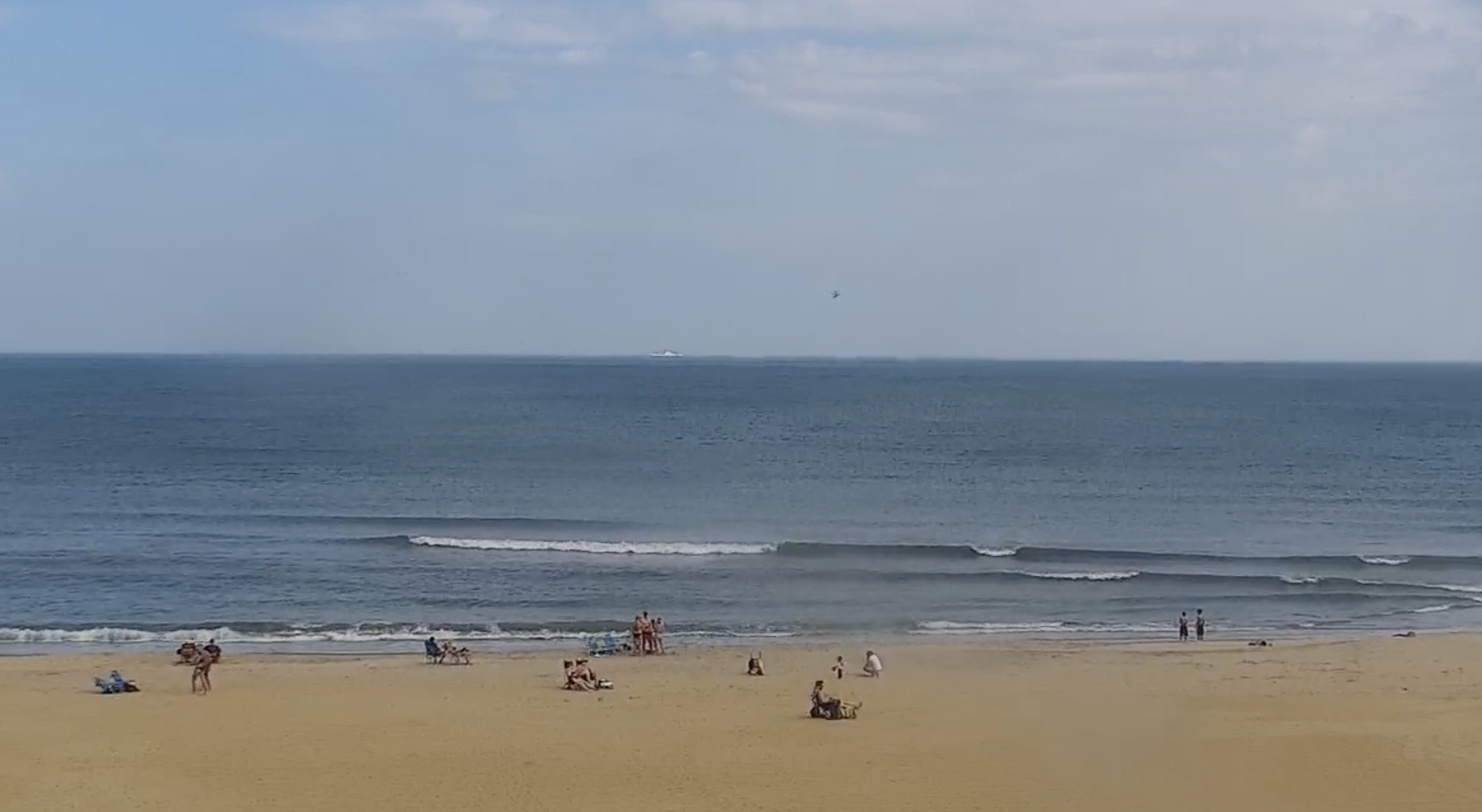An abbreviated ceremony at the British Cemetery on Ocracoke remembering the sinking of the British trawler HMT Bedfordshire off the coast during World War II went off smoothly today under clear, sunny skies.
This 70th anniversary of the sinking on May 11, 1942, almost was canceled because Hatteras-Ocracoke ferry service has been suspended for much of the week, said Janey Jacoby, who organizes the Ocracoke portion of the events that memorialize British and Canadian sailors killed in the war who are buried on Hatteras and Ocracoke.
Since the ferry wasn’t running, there was a concern about how the U.S. Coast Guard dignitaries would be able to get to the island.
But Coast Guard Capt. Chris Wright conferred with the Friends of the Graveyard of the Atlantic Museum in Hatteras to determine the minimum that could be done, he explained, and they decided to use one of their 47-foot boats to bring eight dignitaries across to attend.
Missing was the full regalia of the typical ceremony the Coast Guard stages — with bagpipers, a 21-gun salute, and four-member color guard.
Also attending this year’s event was Tom Cunningham, son of Thomas Cunningham, one of four British seamen buried at the site, which is maintained by the British government.
The Bedfordshire’s mission was to escort Allied supply boats, said Capt. Joseph Kelly of the Coast Guard station in Elizabeth City.
The German U-boat 558 torpedoed the boat off Cape Lookout on May 11, 1942, and all on board perished. The bodies of sub-Lt. Thomas Cunningham and Ordinary Telegraphist Second Class Craig washed up on the Ocracoke beach.
After being identified as HMT Bedfordshire sailors, they were buried with military honors in a plot on Ocracoke, donated by the Williams and Teeter families.
A week later, two more bodies washed up on the beach. Though never identified, these men were assumed to have come from the Bedfordshire and were interred alongside their shipmates.
This year one of the speakers included a representative from Germany, Capt. Norbert Lux, German liaison with the Supreme Allied Command Transformation and United States Joint Forces.
“I suffer the burden of my grandfather and father’s (part in the war), but I’m thankful that you invited me,” he said, noting that Germany, Britain and the United States have been allies since after the war.
“These men (who died) fought on the right side of history,” he told the crowd of about 80. “I am honored and grateful to be a part of this ceremony.”
Cunningham gave a history lesson, noting that trawlers were deepwater fishing vessels that were pressed into service by the British government to escort supply convoys traveling up and down the Atlantic.
“Since trawlers are crewed by fishermen, we share a kinship with the people of the Outer Banks,” he said. “That (these fallen men) are buried here is a tribute to you.”
This is not Cunningham’s first visit to Ocracoke, nor will it be his last. Since he is now retired from his career as an engineer, he will attend future ceremonies, he said.
Cunningham, 69, never knew his father, who died six months before he was born.
“It was just so moving,” said Roberta Tilden of Chapel Hill of the ceremony. “It gives me the chills.”
Tilden, who was born on May, 11, 1942, the day the Bedfordshire sank, came to Ocracoke expressly for this event. She grew up in Rhode Island and said she didn’t know anything about the Battle of the Atlantic, as the continued torpedoing of Allied boats in the early years of the war is now called.
“In New England, they never knew this was going on,” she said.
Donna Hardy of Pittsboro, who was visiting Ocracoke with her husband, Curt, agreed.
“I grew up on the West Coast and we never knew about this,” she said, adding that she was born on Pearl Harbor Day, Dec. 7.
Janey Jacoby, who coordinates the event, was pleased with the day, even though the entire Coast Guard contingent could not attend. She recognized all of the local volunteers who helped with the event, from tending the flowers, cleaning up the cemetery after Hurricane Irene last August, and preparing food for today’s reception.
“It was wonderful,” she said.
Wright, in an interview during the reception following the ceremony, said he found a way through the shoaled up Rollinson Channel.
“We’re glad to help,” Wright said.
Other officials who spoke were Lt. Todd Porter of the Coast Guard, Lt. Jason Rochester, a U.S. Navy chaplain, Commander Douglas McDonald, Canadian Naval attache, and Commander Paul Beattie of the Royal Navy, UK, who serves in the Pentagon.
“We were allies then, and we still are,” he told the crowd.
The event also recognized Ocracoke resident Earl W. O’Neal, Jr. and his continued research on the history of the Outer Banks.
An exhibit about World War II on the Outer Banks is on view at the Ocracoke Preservation Society Museum.
Ocracoke FM radio station WOVV 90.1 broadcast the entire ceremony and may possibly re-broadcast it Sunday morning.
The British Cemetery event is sponsored by The Friends of the Graveyard of the Atlantic Museum, the U.S. Coast Guard, the Ocracoke Community, National Park Service, and the Commonwealth War Graves Commission.
FOR MORE INFORMATION
To read an article about a new book about the Battle of Torpedo Junction, “War Zone: World War II off the North Carolina Coast,” go to http://islandfreepress.org/2012Archives/05.09.2012-NewBookDetailsAHorrificChapterInWorldWarIIHistoryThatUnfoldedOffTheNorthCarolinaCoast.html
CLICK HERE TO VIEW SLIDE SHOW
CLICK HERE TO VIEW SLIDE SHOW (IPad, IPhone and other non-flash compatible device users)














